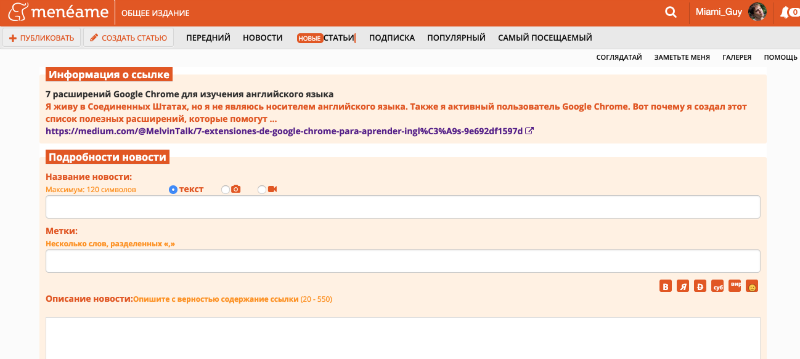Personal experience: how we engaged in Hispanic startup promotion in Latin America

I have been professionally engaged in marketing, and over the past months I have been helping a new startup - a service for fixing errors in English texts. In the course of work, his team and I decided to experiment with the target audience - in particular, try to get feedback from native speakers of Spanish.
We did not have a marketing budget in Latin America, so we decided to use content marketing. However, it turned out that there is very little sensible material about how and where to promote your company in Spanish. I had to figure it out on my own, and according to the results of the experiments I want to share my experience.
Step # 1: collecting information
We did not know anything about the device of the Hispanic segment of the Internet, so for starters it was necessary to study it at least basic. There are no native speakers of the Spanish language in the team, so there was nowhere for us to get any insider information from, the data was collected in Russian and mainly English.
We suggested that Spanish-speaking users should have their own analogues of popular sites for publishing content. For example, Reddit. Various search queries and studying thematic threads on sites like Quora didn’t give much information - we found the popular Taringa site, and that’s all.
I had to order a consultation of an SMM specialist of a native speaker of Spanish on Upwork. After that, things went better.
Step # 2: Publish Content
We had a number of interesting English-language materials in the "partisan" format, and it was not difficult to translate them. A much more interesting question is where to publish these texts.
We studied various blog platforms and decided not to complicate the situation and publish content on Medium. This option had several advantages - the platform is easy to use, it has a familiar interface, the site can publish content in local languages (even in Russian there are a number of interesting blogs), there are statistics for each article, which includes information about the source of referrals to it - this was supposed to help us in planning further work.
Step # 3: Promotion
For the “seeding" of content, we selected two main resources:
- Taringa.net is a popular aggregator site in Latin America, somewhat similar to Reddit, with more than 21 million visitors.
- Meneame.net - 9.5 million visitors.
The original table had more sites, however, a significant part of them turned out to be too small and did not give any traffic at all, gradually we refused to repost there even in the "heap" mode.
On each of them you can publish links and articles, there is no particular difficulty. Some resources, like Meneame, impose additional restrictions - for example, before publishing your post, you need to make 7-8 likes to other users' posts.
Thanks to the auto-translation feature in Google Chrome, publishing the content itself is also straightforward:

Our task was to get product feedback, so it was important to expand the geography of the potential audience. Strangely enough, Reddit came to the rescue here.
It turned out that on this platform there are subsections dedicated to different countries - and the content in them is published in local languages. We were lucky, and the theme of our project was well suited for publication in such subreddits - the tool is useful for learning English, it is interesting to many Hispanic users.
As a result, we placed the content in such subreddits:
- r / aprendeingles / - a section devoted to the study of English;
- / r / es / - general thematic Hispanic subreddit, 14.3 thousand users;
- / r / argentina / - 92 thousand subscribers;
- / r / vzla / - section of Venezuela, 34.5 thousand subscribers;
- / r / Colombia / - 13.8 thousand subscribers;
- / r / chile / - 48 thousand users.
What is the result
In total, within a month we published 4 materials - several thousand people read them, we got a good conversion in registration. The Hispanic audience is quite actively using the service and acquiring premium access. Moreover, the project was noticed by Latin American journalists and bloggers. In particular, after a review on the popular Argentinean IT resource wwhat's New, several thousand people came to us in a couple of days.
A typical traffic distribution for articles looks like this:

Aggregate sites like Meneame and Taringa show good performance, there is a live audience on Reddit. Expect that the material will be promoted by Medium algorithms on the platform itself is clearly not worth it - here our initial hypothesis was confirmed.
Conclusion
Of course, such content marketing is not a tool to attract large volumes of traffic, but if you want to test new markets with a zero budget, the combination of Medium + aggregators + Reddit turns out to be quite working.
